What To Expect From 2021? – Rebranding Of Famous Companies
Before we discuss famous companies rebranding in 2021, let’s talk about the preceding year. The year we’re bidding farewell to – 2020.
2020 has been one heck of a year! It all started with Covid-19 spreading across the globe, followed by the worldwide panic that caused people to buy bulk quantities of storable food and other necessities – like toilet paper.
That resulted in shortage of many food items and supplies in the market, amid which, countries implemented lockdowns, stopped travel related activities – like flights, and sealed their borders.
Whole populations went into quarantine, hospitals were overwhelmed with patients and suspects, Covid-19 testing kits, ventilators, and all the relevant medical supplies were running short.
In the middle of this chaos, wildfire season approached and fires broke out. Australia and California were known to be affected by these fires the most. Acres and acres of land were turned into ash.
Before all of this could be over, the brutal case of George Floyd’s death surfaced in the media, and riots broke out in America.
George Floyd’s death became a representation of ongoing racism in the USA and it sparked rage across the population causing “Black Lives Matter” to become the central theme of the protests and trend all over media.
To top it off, conspiracy theorists made it harder for people to battle the Covid-19 pandemic by spreading misinformation about masks, Corona treatment, doctors, and the government.
And how can we forget? Swarms of locusts attacked 23 countries, eating away and destroying a great percentage of their crops, pushing many countries further into crisis.
Then came the US presidential elections, and how can we not get anxious about it when the peace and stability of many countries depend on it including the war-stricken zones?
All in all, it has been a bumpy ride, to say the least.
While it might make sense to think about what to expect from 2021 in the light of all that went by in 2020, what does all of this have to do with rebranding of famous companies?
You’re about to find out!
Branding Around Morals
Most of the issues that our world faced in 2020 were either caused or exacerbated by lack or denial of morals.
That’s exactly why many brands are met with the need of rebranding in 2021. Emerging generations have realized how things have been in past and decided that’s not the way to go about the next decade.
They’ve observed the basic ethics being violated at every step of life, how it impacts everything years down the line and how badly it needs to stop.
People in past and up til now have been living in moral crisis to say the least.
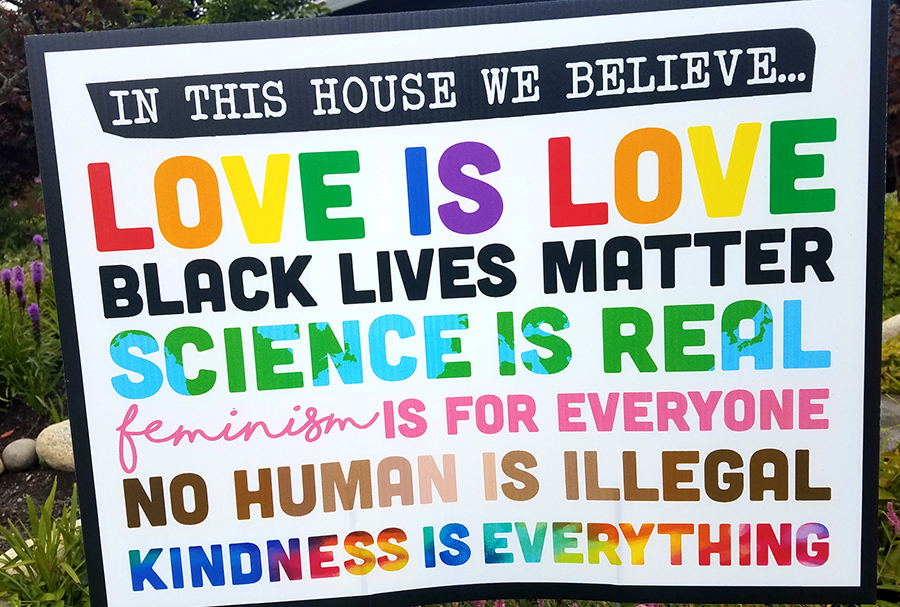
Even when people did not lack or deny morals, they simply didn’t take their moral responsibilities as seriously as they should have taken.
Seasonal wildfires were a result of climate change, and one of the major hurdles in the way to recovery of the planet was that many people – especially the ones in power – simply refused to believe the scientists.
When millennials realized that, eco-friendly brands started emerging, and a similar cycle is expected to repeat through rebranding in 2021 with Gen-Z approaching their adulthood.
George Floyd’s death was caused by police brutality coming from ingrained systematic racism.
Domestic abuse went up during the lockdowns, and that is another issue where feminism was needed.
The refugee crisis had been dealt a wrong hand throughout the Trump administration and it caused several refugees from countries going through wars that the US had been involved in to suffer miserably.
The Covid-19 itself originated in a market in Wuhan, China – A place known to have normalized unhygienic practices and animal cruelty while preparing all sorts of food.
A lot has changed in the past decades. Many things that were unacceptable or taboo in the past eras have become normal in recent years.
In an effort to resist that change, many people have given up the fundamental and basic moral principles known to all mankind – Kindness, tolerance, peace, love, education, human rights, equality, and respect.
People fighting for their right to be treated with these basic moral elements or human decency seemed to have had enough.
In the year 2020, many have called different brands out on their racist origins and the pressure grew to the point of having those trends go viral, encouraging more people to boycott such products.
Rebranding Of Famous Companies
A lot of companies listened to their consumers and took the feedback seriously.
Although they were decades-old brands, they could no longer move forward with what was deemed okay or even appealing back in the day.
For the sake of time and simplicity, we’ll only talk about a handful of the popular brands that have planned to change as a part of their long due moral obligations.
You’ll definitely find many more products on the shelves that look slightly or entirely different in 2021 as a result of rebranding of famous companies on moral grounds.
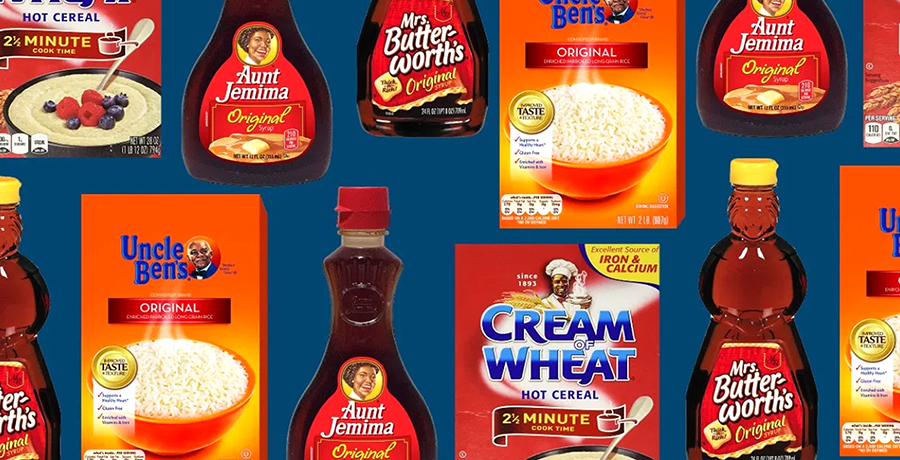
Racism has been a hot topic this year, because of that, most of the companies that had some form of racists roots had to go through rebranding by 2021.
People were not having it this time, so the brands couldn’t get away with it and still make profits off of the communities they upset.
An important read for you: Merchandise Branding: Why Is It So Important For Your Brand?
Aunt Jemima By Quaker Oats
One of the most popular cases of rebranding is Aunt Jemima by Quaker Oats owned by Pepsico.
A viral TikTok from Kirby highlighted how the packaging and design of the whole brand is a reminder of a racist stereotype coming from the abusive era of black slavery.
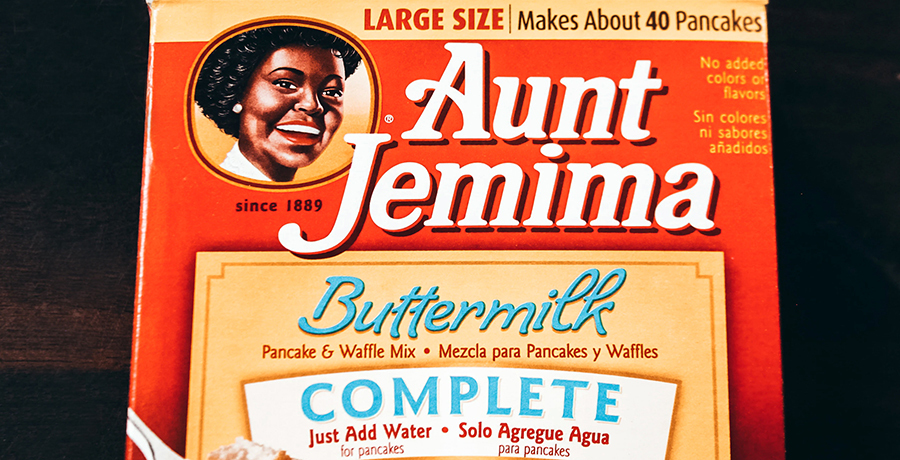
The Pancake Mix marketed and sold by Quaker Oats with the name Aunt Jemima was originally a recipe of a black woman named Nancy Green.
She was the former slave, cook, nanny, and activist who managed to escape slavery and start her own business as per her descendants.
Quaker Oats hired her for her recipe and the strong trust she had earned from the community through her cooking.
Nancy Green’s descendants say that she had been the face of that brand, and later on other actresses were hired as their brand ambassadors to represent Aunt Jemima.
The descendants of Nancy Green do not wish the black woman to be removed from that brand as they consider it to be her legacy and a mark of her personhood.
Then why is this brand one of the prominent ones to go through rebranding in 2021?
What’s the problem? Why are others enraged by it? And what do they find racist about the brand?
The primary trigger for the black community coming from this brand was that it was believed to have originated from a play where a white actress took the role of a black character named Aunt Jemima.
She painted herself black and appeared to be a slave content in serving her masters, caring for their children while neglecting her own, and being a stereotypical black mammy.
One of the most triggering things for black people to witness is a white person trying to mimic them in any way. It appears derogatory due to the long-standing history of racism against the black community and the power dynamics at play.
The second offense was the stereotypical role, normalization of superiority complex in whites, and perpetuation of an inferior image of blacks that was apparent in this brand.
The third most irritating part of their branding was the reminder of the era of black slavery in the United States.
All of that combined caused a greater backlash in 2020 with racism being the hot topic. Despite Nancy Green’s family’s dislike for the idea, the Quaker Oats have announced that they will be rebranding Aunt Jemima completely and might even change the name.
The new version is expected to hit the shelves in 2021.
Uncle Ben’s By Mars
Uncle Ben’s rice is all too famous for receiving criticism over racial stereotyping of the black community. Seems like Mars, too, will be rebranding it by 2021.
People have an issue with the image of a black man with a bowtie on the packaging as well as the name Uncle Ben.
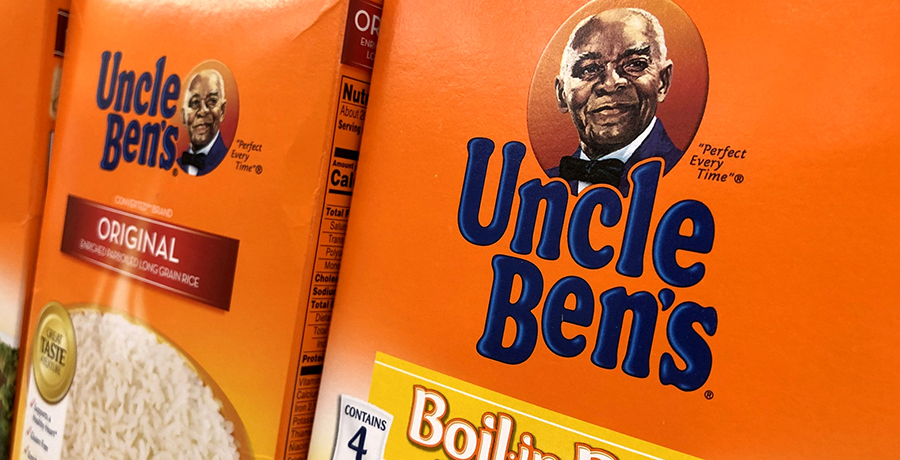
Most critics claim that the bowtie represents servitude, and referring to a black man as the uncle was far too common in the era of slavery and segregation.
While most white males would be addressed as Master, Sir, or Mister throughout their lives – from childhood till death – black men were never given those titles even when they were free and aged.
If they happened to be senior and had no biological relation with people conversing with them, they were called uncle as opposed to other titles. Many believe that this is what the name Uncle Ben’s is based on.
The company acknowledged the effects of this type of imagery and branding.
In their defense, they said Uncle Ben’s character was inspired by the head waiter named Frank Brown from a Chicago restaurant.
In 2007, Mars raised Uncle Ben’s rank to the chairman of the rice company in hopes to show their commitment towards racial equality.
People felt there’s still room for improvement and the title needs changing. With that, Mars planned a complete rebranding for 2021.

The new brand will not have a picture of the black character, and the name of the product line is changed from Uncle Ben’s to Ben’s Original.
Alongside these changes, Mars hopes to make a difference through community outreach programs to ensure underserved communities have access to good nutrition.
Mars has also arranged a 2 Million Dollar fund in partnership with the National Urban League to provide scholarships for aspiring chefs from the black community.
Ben’s Original will be focusing on Greenville town of Mississippi to provide better education opportunities for over 7500 students and availability of fresh food to the locals.
That’s not all. Ben’s Original is working to improve the representation across its workforce, administration, and leadership to make sure no discrimination happens within their organization.
Ben’s Original is expected to be seen in stores in 2021.
Eskimo Pie To Edy’s Pie
Up until now, we’ve only talked about racism against the black community, their reaction towards anything that depicts it, and rebranding of famous companies that once promoted black stereotypes.
However, now our approach will be growing more diverse as more ethnicities get involved.
What better way to brand a vanilla ice-cream bar covered in chocolate than with a reference to freezing arctic cold and people living in that climate?
Wouldn’t it be the perfect way to go about it? Turns out it is not when it’s racist.

Dreyer’s Grand Ice Cream thought it would be a good idea to have a product named after people living in the arctic – Eskimo Pie.
The product has been around for more than a century, and although it may not be as famous today, it had its golden days of popularity.
Eskimo is a term considered derogatory for communities from the arctic region – mainly Canada, Alaska, and Greenland.
A name they’re more comfortable with is Inuit. The packaging of this ice-cream, too, is based on racial stereotypes against Inuit people.
Eskimo Pie is planned to be renamed and rebranded as Edy’s Pie – celebrating one of the company’s founders.
Eskimo Pie’s production has been paused for a while until the new Edy’s Pie is ready to hit the store. It is expected to hit the store after rebranding in 2021.
Geechie Boy Mill
The list of famous companies initiating the process of rebranding for 2021 includes Geechie Boy Mill too.
Geechie is a term used when referring to a specific group from the black community. These are descendants of slaves from West Africa possibly from the region called the Slave Coast of West Africa who were trafficked into the USA.
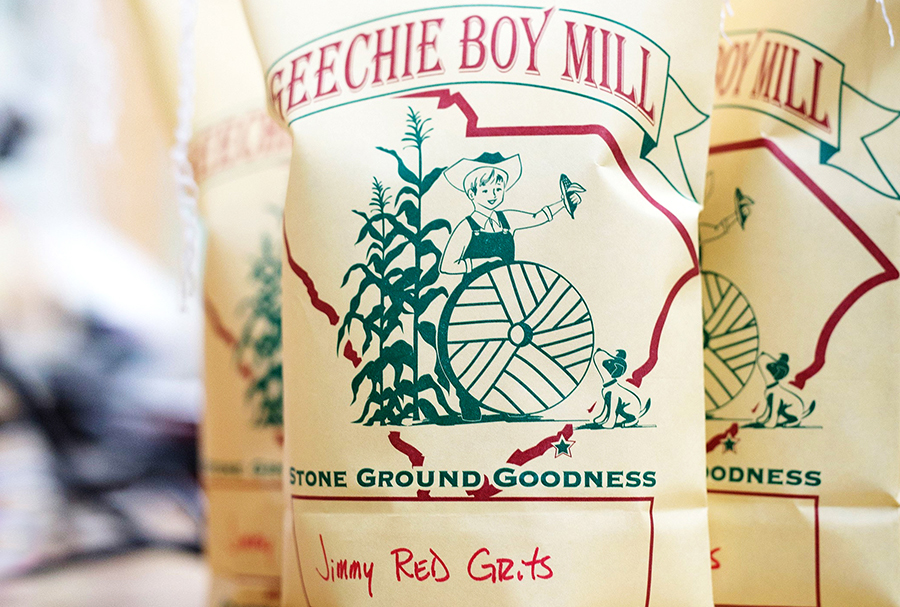
Later on, this community settled in the USA and most of them lived around Ogeechee River – hence the name Geechie.
The community of slaves from this region has many other nicknames too – such as Gullah, and other spelling variants of the term Geechee. They retained a lot of their cultural and ethnic traits such as language, accent, dialect, behavior, practices, and the way of living.
Geechie later became a derogatory term as an aftermath of slavery and racism. At this point, this term wasn’t limited to the descendants of a community that lived in the Ogeechee River area.
It was directed at any and every black person whose style and accent wasn’t fully American, or who retained any of the traits passed down from their ancestors apart from their looks.
This wasn’t the only problem with the name Geechie Boy Mill. When Betsy and Greg Johnman acquired the Geechie Boy Mill in 2003 and decided to keep the name, many critics accused them of cultural appropriation.
The criticism continued up until 2020 when the owners of the Geechie Boy Mill decided to respect the black community and change the name to Marsh Hen Mill.
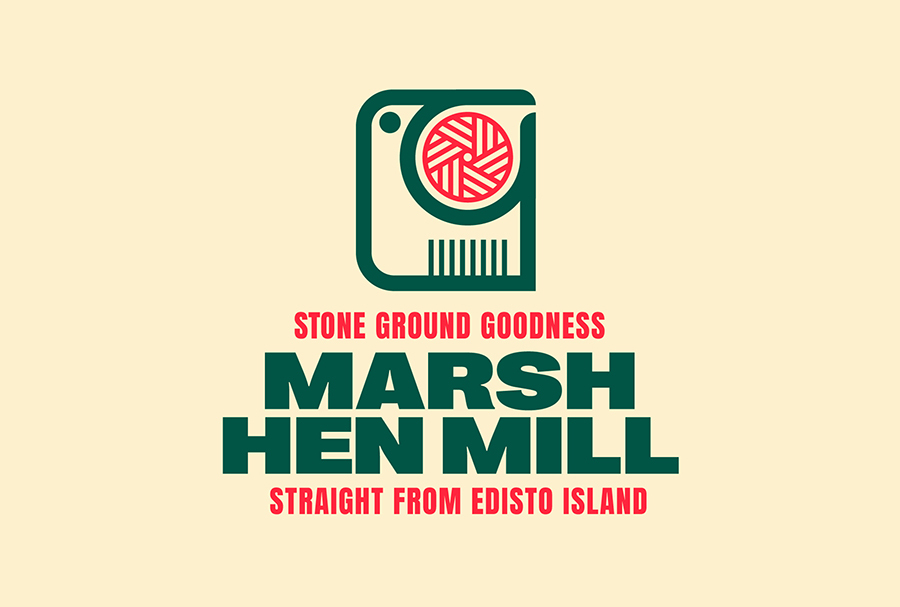
Greg and Betsy Johnman finally realized that racism – intentional or unintentional – will only hold them back.
This change coincides with rebranding of famous companies like Aunt Jemima, Uncle Ben’s, Eskimo Pie, and many more to come. It seems like stores will be full of rebranded products in 2021.
Washington Redskins Into Washington NFL
If you think upcoming rebranding for 2021 is limited to products and services only, wait until you find out football teams are moved by the resistance against racism too.
Washington Redskins changed their name to Washington National Football League. Their former logo comprised a Native American person in their stereotypical getup and feathers that represented native culture.
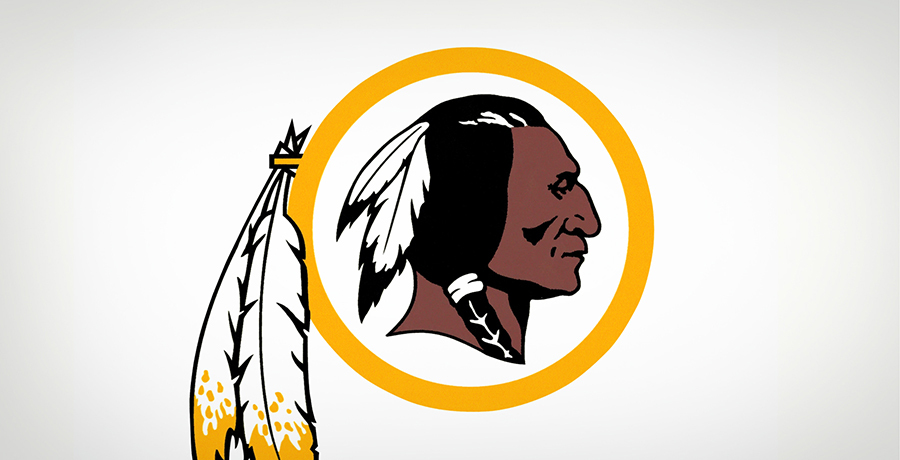
Their new logo hasn’t been finalized yet, but one thing’s for sure, they aren’t using Native American culture or people as a tool to market themselves anymore.
One of the major problems with this one was the word Redskins. It is considered derogatory and offensive to use that term when referring to Native Americans.
Along with that, many Native Americans don’t like the idea of their culture, heritage, or appearance being used as a marketing tool – especially by white people.
The feathers we often associate with them are sacred to them. According to some Native Americans, these are earned in their communities through acts of service or impactful deeds.
It only makes sense to be irritated by the sight of random cosplayers wearing feathers or certain posters containing them as a stereotype.
Taking all of this into account, Washington National Football League seemed a better and more accurate choice of a name at present.
Their logo and name haven’t been finalized yet, so the Washington NFL is a temporary name used for clarity while the team decides what the end result should be once they’re done rebranding for 2021.
You may also like: Should You Get Logos For Personal Branding?
Cream Of Wheat By B&Gs
Just a day after Mars Inc.’s announcement to rebrand Uncle Ben’s came an announcement by B&Gs. They plan on removing the image of the black chef from the packaging of Cream Of Wheat.
Yet another famous company to go through rebranding in 2021!
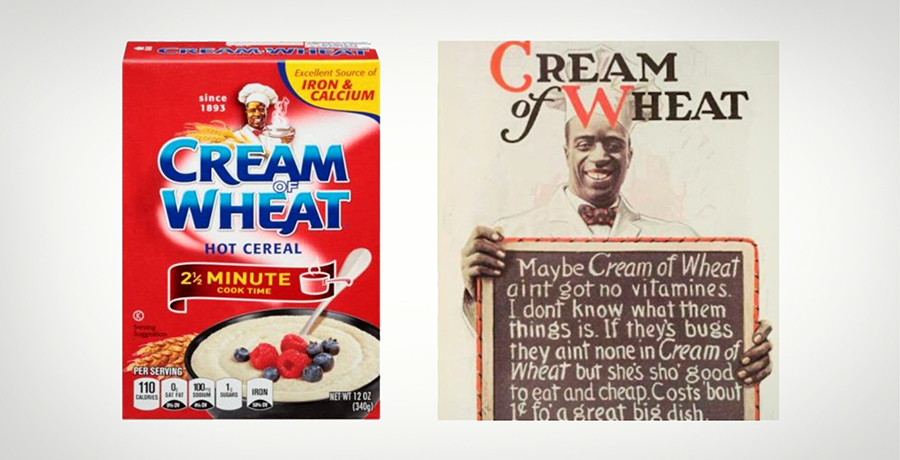
Now, what is wrong with an image of a black chef on the packaging of a product? Turns out it came off as insensitive and offensive because it was mere mockery of black people.
The brand claims it is based on a real chef named Frank White, but the critics say it was a fictional character formed by the brand to make fun of the black people.
According to them, it was intentional mockery at least from 1890 till 1920 because this character was made to appear dumb and supposedly comical. The company announced that it will take a closer look to ensure they don’t end up supporting racism.
A brand has to save its face for sure, and that might be why they denied ever creating an image of a black man to mock him, but some of their advertising content from the past says otherwise.
Either way, the brand is going under a change and the new packaging without the black chef is expected to appear in stores in the first quarter of 2021.
Mrs. Butterworth By Pinnacle Foods
Pinnacle Foods has decided to fall in step beside rebranding of famous companies with products like Aunt Jemima, Uncle Ben’s, and others to eliminate any intentional or unintentional traces of racism from their brand.
To be fair, it does look like an honest mistake when it comes to Mrs. Butterworth’s pancake syrups.
In their defense, they said they only intended to make people emotional by portraying a matronly figure of a loving grandmother, however, they do acknowledge why it can be perceived as anything else.
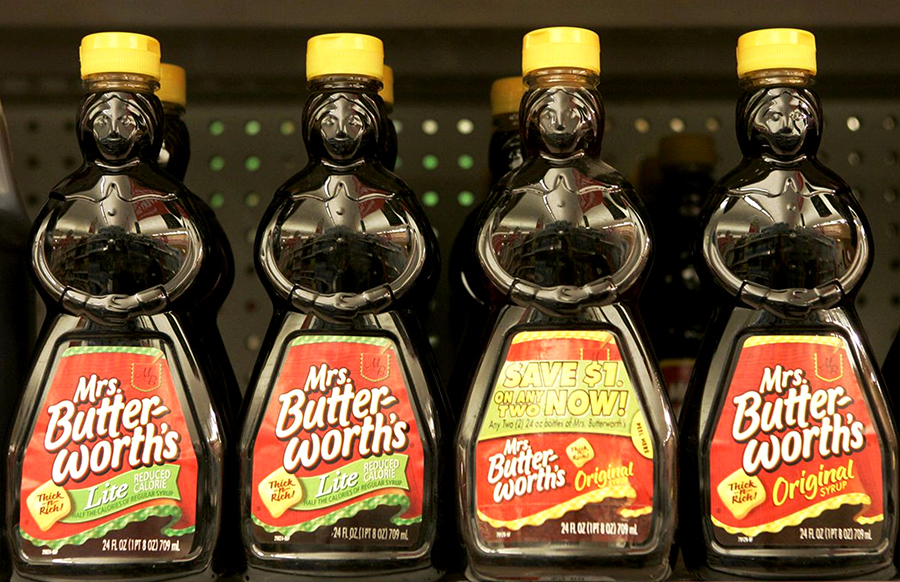
The shape of the bottle is, indeed, of a woman with an apron. The bottles are transparent, and the syrup makes them look dark, almost black.
This irks the black community because it has a striking resemblance with the black salve mammy stereotype.
It can be triggering for some, offensive to many, and insulting for others. Not to mention how big of a trigger it can be to be reminded of your worst times.
Pinnacle Foods has taken all the criticism into account and plans to complete the product’s rebranding by 2021.
Land O’ Lakes
I personally find Land O’ Lakes’ way of changing their brand packaging better than the other brands we talked about.
They were sneaky and didn’t create much noise around it. In 2020, Land O’ Lakes simply removed Mia – the Native American caricature – from their packaging.
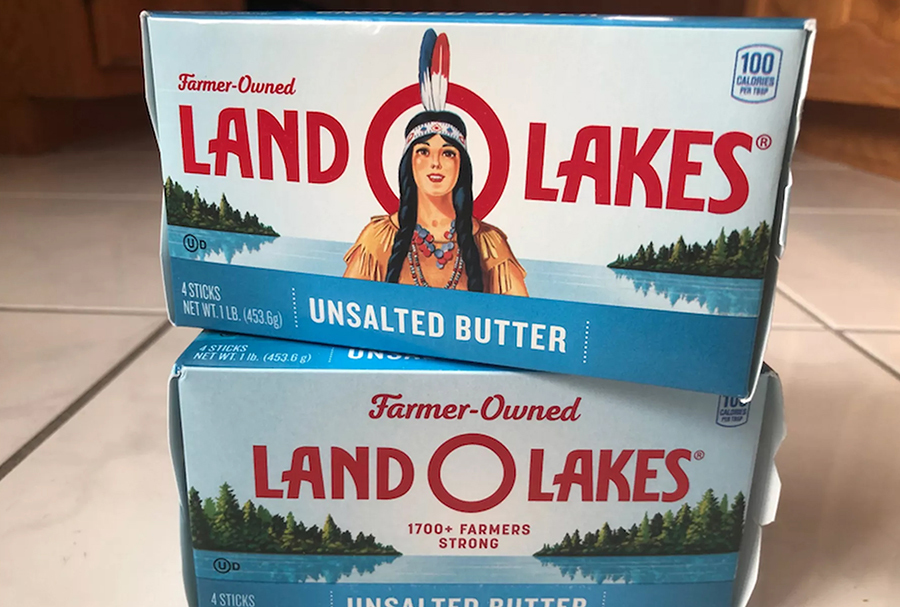
When it hit the store shelves, consumers noticed and tweeted about it. Some called it a much-needed change, and others just appreciated the effort made by the brand to be politically correct.
By now, you probably know that Native Americans don’t like their culture and heritage being used as a tool for marketing or advertising.
But there’s more to it. Not only does the presence of Mia on their packaging appear to be an advertisement, but also a bit offensive because of how she is presented.
Her kneeling down while presenting the dairy product might be intended to show a welcoming gesture but it can also be taken as a submissive pose.
In a nutshell, it wouldn’t have been a great idea to carry on with this image in and after 2020, so they made a smart choice of removing it altogether.
The new packaging looks almost the same as the old one, as in, the environment and settings she was in were still there. The lake was the same, and the text carried the same design.
The only difference is that it is prominent for being farmer-owned instead of being associated with Native Americans.

Land O’ Lakes now feels the need to celebrate their original farmers; you will see a lot of their marketing material containing pictures of and mentioning their farmers.
This is the change Land O’ Lakes chose to make while nearing its 100th anniversary amid of famous stories about rebranding in 2021.
Background Story
So, why is rebranding of famous companies crucial to the survival of those brands as we enter the new decade?
These brands have carried racist imagery with them for decades. The question remains, what caused so many of them to change all of a sudden?
Why did all of them choose the year 2020 to initiate such a change?
We did talk about George Floyd’s tragic death and the resulting protests earlier but it was a brief introduction.
Let’s get specific and discuss the details of the whole situation.
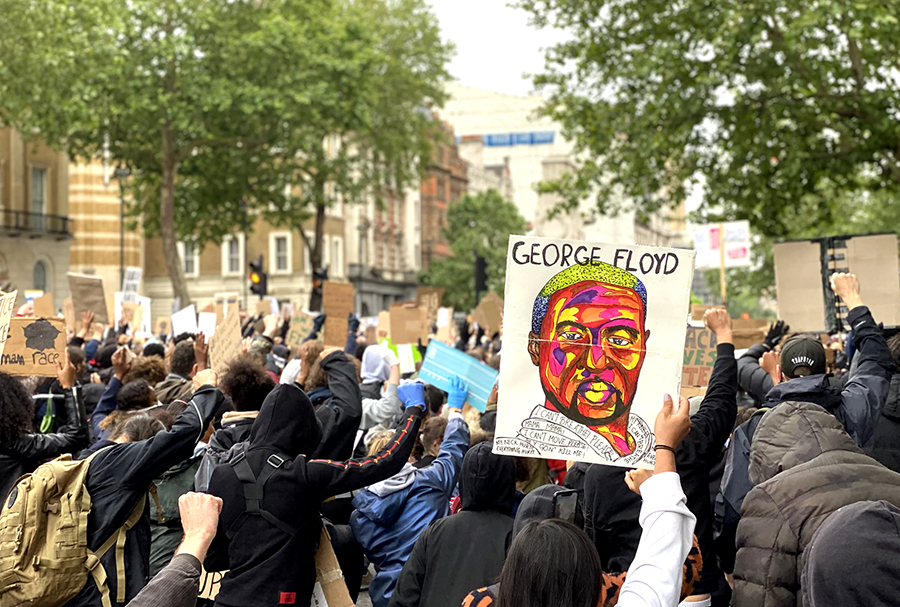
George Floyd was accused of using a counterfeit bill and therefore arrested by the police in Minneapolis, Minnesota.
The officers on duty were brutal, and despite George Floyd’s complaints about being unable to breathe, kept him down.
One officer named Derek Chauvin had placed his knee on Mr. Floyd’s neck for nine and a half minutes while other officers made sure no bystanders intervened in the situation.
Despite countless pleas to lift his knee from George Floyd’s neck, Chauvin continued to strangle Floyd through it.
It is believed that George Floyd kept pleading that he couldn’t breathe and expressed that he feared he was going to die.
After a few minutes, George Floyd stopped speaking but the knee was skill placed on his neck for over two more minutes.
The police officer Derek Chauvin did not remove his knee from George Floyd’s neck until the medics told him to, thereby killing George Floyd.
The incident might’ve been brushed under the rug like countless other cases had the videos of the scene not gone viral or created an outrage in the world.
When they did though, the officers were charged with “Unintentional Second Degree Murder” and dismissed.
George Floyd’s death might’ve looked like the primary reason behind the protests, movements, and anger in the black community but in reality, it was just the last straw.
There have been incidents upon incidents of homicide, assault, violence, and abuse against the black people that have surfaced social and digital media all the while justice and law enforcement systems turned a blind eye to them.
Many people of color went missing and were killed but the culprits were never charged.
With this newfound hype around the issue of racism, influencers did what was in their power to contribute to it, which meant educating people, leading them, calling out brands on racism or discrimination, and influencing trends for the future – the year 2021.
All of this led to companies being forced to follow through their plans of rebranding in 2021.
What To Expect From 2021?
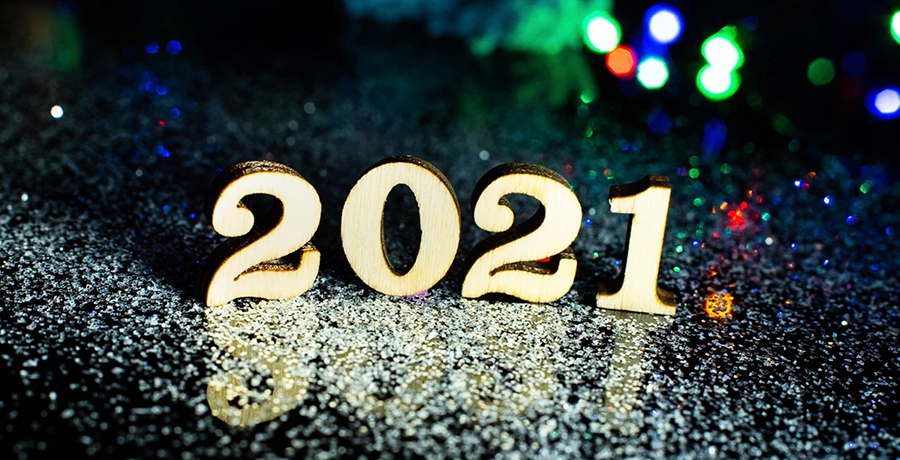
People have high hopes for 2021.
With the chain of events surrounding racism and the collective rebranding of famous companies including the ones on our list, we can expect the trend of being politically correct to rise.
More brands changing their outlook means more marketers will be careful about their ads and strategies.
The year 2021 seems to bring more inclusivity into our daily lives, but let’s not forget, we still have a long way to go until the existing generation forgets all the stereotypes or gets replaced by the newer generation.
Hold your horses! That’s not the only trend we’re expecting in the year 2021. Fortunately, a vaccine for Covid-19 has been developed and introduced to the public for use.
Even though a mutant of Covid-19 has appeared in London that is more contagious than its predecessor, the vaccine developed for Covid-19 works just fine on that one too.
So the world is finally going back to how it was in 2018 or 2019? We’re not sure about that. After having a full year of masks, sanitizers, home-based work, social distancing, comfy clothes, and a myriad of not so normal habits, are we ready to give them all up in a snap?
What should we expect from 2021 if and when the Covid-19 and Covid-20 have been defeated?

One thing is for sure, tourism will rise like never before. People who have been locked up in homes, neighborhoods, or within their areas will definitely celebrate their freedom with a vacation.
Masks will still remain the norm. We must not forget, Covid-19 has become preventable but not been defeated yet.
A lot of people have grown comfortable with home-based work. Many companies have realized how inexpensive remote work can be and those who can surely would want to maintain their workflow with remote teams.
With social distancing having been practiced for this long, we can expect people to have a larger bubble of personal space even when things go back to normal.
The year 2020 has given more space to technology in our lives, and I don’t think there’s any going back when it comes to this one.
People have set up their entire premises on digital media, which has made many of them more invested in their screens.
Even the people who could go days without internet will need it now. The world has grown more connected with people having adjusted to video conferencing through Zoom, Google Hangouts, and other social media.
Online education was already a common thing among the young ones, but being pushed and locked shut into it is something that happened to all generations this year.
That’s pretty much why virtual classrooms are on the rise and popping up in many world-class universities.
What we need now is better policymaking for the World Wide Web without interfering with the autonomy of individual users.
With that said, it is possible that a lot of rebranding will occure in and after 2021 due to such factors as well.
You may find it interesting: Watch out for these crazy 12 branding trends in 2021
In Conclusion
We’re all hoping 2021 would be the year of healing and betterment for the world – fingers crossed.
Branding around morals and political correctness will be of utmost importance in the days to come.
Just like Aunt Jemima, Uncle Ben’s, Eskimo Pie, Geechie Boy Mill, Washington Redskins, Cream Of Wheat, Mrs. Butterworth, and Land O’ Lakes, if your product has the slightest of the nuance of racism or cultural appropriation, you better rebrand it before you get called out.
Apart from rebranding of famous companies, there’s a lot to come in the year 2021. Will our newly developed habits stay a part of our lives as we get out of the pandemic?
Will we defeat Covid-19 in the year 2021 or will it take more time for vaccines to get common?
Should we fear this newly evolved COVID-20? Will there be more mutants emerging in the near future? Will it cause another pandemic or should we relax and wait for the vaccines to get common?
Get a Free Quote
+1 845 3770255
Call on anytime
To discuss your project
